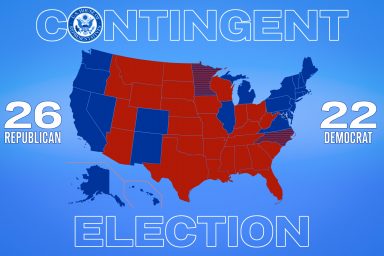Florida Gov. Ron DeSantis (R) is brazenly defying campaign finance rules to give himself an $80-million edge over his opponents in the GOP presidential primary.
|
Listen To This Story
|
Florida Gov. Ron DeSantis (R) is brazenly defying campaign finance rules to give himself an $80-million edge over his opponents in the GOP presidential primary, experts say. To pull it off, he has to hope that a dysfunctional Federal Election Commission (FEC) stands by and does nothing to stop him — and that’s traditionally a pretty safe bet.
Here is what DeSantis is trying to get away with: Because there are no contribution limits under Florida’s campaign finance laws, the governor raised $173.2 million for his state-level political action committee (PAC). That is way more than he needed to win reelection, so, predictably, about half of that money was left over at the end of the race.
However, because there are federal contribution limits, his national campaign is not allowed to use that money.
“There’s no question that it’s illegal for a federal candidate to transfer money they raised for a state committee to a federal super PAC,” Erin Chlopak, senior director for campaign finance at Campaign Legal Center and a veteran of the FEC’s Office of General Counsel, told the campaign finance watchdog group OpenSecrets.
That does not seem to bother DeSantis or his allies, who have earmarked that $86 million to play a major role in his plan to win the GOP nomination.
To do so, the governor announced earlier this month that he is no longer associated with his state-level PAC. Instead, he turned the reins over to one of his closest political allies — Republican state Sen. Blaise Ingoglia.
Now, it seems that this PAC, which is no longer associated with DeSantis in any way (wink wink), plans to transfer all those millions to a federal super PAC that will play a major role in getting the governor elected.
To better understand what is happening here, imagine that a Girl Scouts troop is giving an iPad to the scout who sells the most cookies. Little Ronda, who has very rich parents, really wants that iPad. The problem is that the purchases of a Girl Scout or her relatives are excluded from the total. And the family is also prohibited from giving money to others to buy cookies.
So, Ronda first opens a lemonade stand, sells a glass of lemonade to her parents for $5,000, and then hands over control of the lemonade stand to the family’s maid, Maria. Maria then uses that money to buy cookies, and Ronda wins the iPad.
No rules are broken, just the spirit of the competition.
However, in the case of DeSantis, these rules do exist.
“Although super PACs are permitted to raise and spend unlimited amounts of money, an essential, fundamental legal requirement is that they operate independently,” Chlopak told OpenSecrets. “That independence is nonexistent when a super PAC receives tens of millions of dollars from a state committee tied to the very candidate it is supporting.”
There is just one problem: While the rules are in place, a dysfunctional FEC is not enforcing them. With three Republican and Democratic commissioners each, the agency is frequently deadlocked on questions of whether various campaign financing schemes are legal (including one similar to this one — ironically involving an ally of former President Donald Trump, whom DeSantis is trying to defeat).
DeSantis is clearly counting on that to happen again this time. There is just one interesting wrinkle: How will the Republican commissioners rule if the “victim” of a campaign finance violation is Trump himself?




